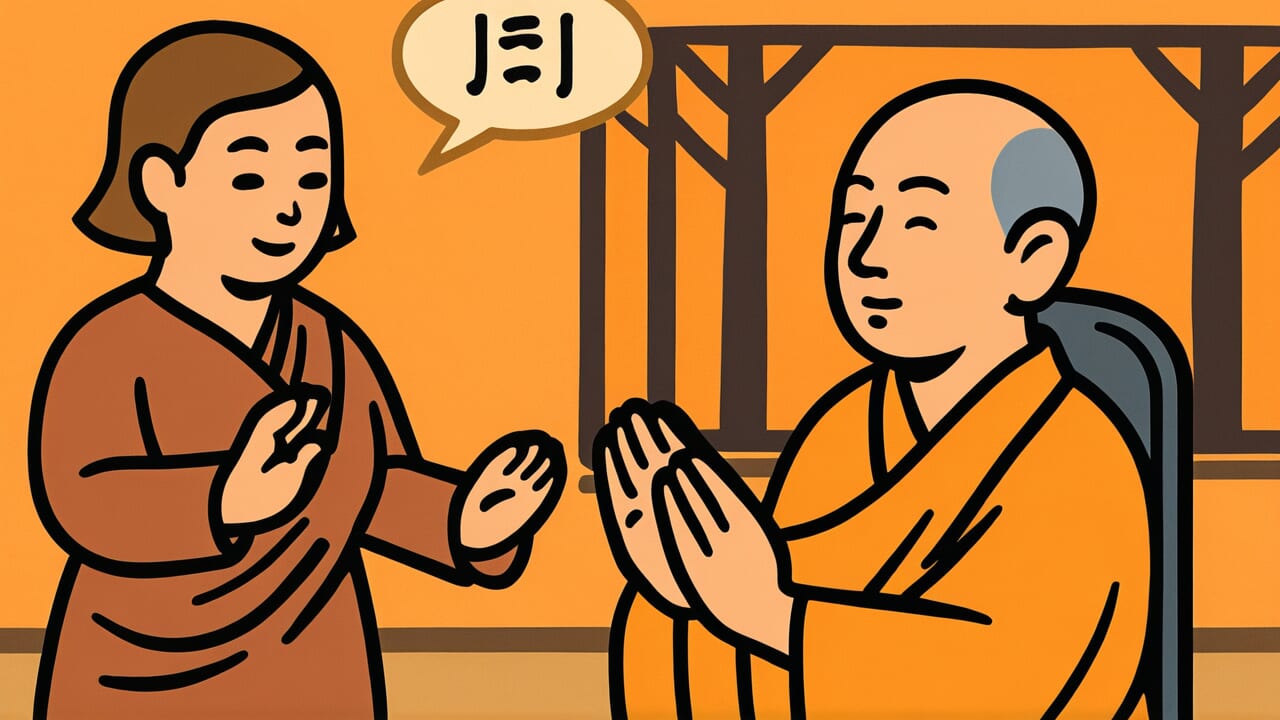How to Read “Going to paradise with another person’s prayer”
Tanin no nenbutsu de gokuraku mairi
Meaning of “Going to paradise with another person’s prayer”
This proverb means relying on someone else’s efforts or good deeds to gain benefits for yourself.
It criticizes people who make no effort themselves but take advantage of others’ hard work and achievements. They simply enjoy the rewards without contributing anything.
You might use this phrase when someone does nothing on a team project but happily accepts praise when others succeed.
It also applies to people who casually use connections or information that their friends worked hard to obtain.
The proverb points out that gaining benefits without effort is morally wrong.
Even today, people who ride on others’ success without working themselves are criticized as free riders. This saying warns against exactly that kind of behavior.
Origin and Etymology
This proverb is deeply connected to Buddhist Pure Land teachings.
Nenbutsu means chanting “Namu Amida Butsu.” People believed that chanting this prayer would allow them to be reborn in paradise. Gokuraku mairi means going to the Pure Land paradise.
Buddhist teachings say you must chant prayers and practice spiritually yourself to reach paradise.
However, this proverb describes someone who never chants prayers themselves. Instead, they try to reach paradise by relying on the merit of someone else’s prayers.
During the Edo period, Buddhism was deeply woven into everyday life. Prayer groups called nenbutsu-ko were very popular.
Some people had no faith or spiritual practice themselves. Yet they tried to benefit from others’ devotion and effort. This proverb sharply captures that human tendency.
The phrase structure emphasizes “another person’s” to highlight the dependent attitude that lacks personal effort.
What began as a religious expression gradually became a criticism of human relationships and social behavior in general.
Usage Examples
- He always does “going to paradise with another person’s prayer” in group work, so I can’t trust him
- She talks about the project’s success like it was her achievement, but it’s completely “going to paradise with another person’s prayer”
Universal Wisdom
This proverb has endured because it perfectly captures a fundamental human desire: wanting to take the easy way out.
Deep down, everyone wishes they could achieve results without struggling. That’s not necessarily bad. It’s actually human wisdom seeking efficiency.
However, the proverb warns against the moment when this desire turns into dependence or exploitation of others.
Humans are social creatures who support each other. For these relationships to stay healthy, there must be balance between giving and receiving. One-sided relationships eventually fall apart.
What’s interesting is that this proverb goes beyond simple criticism. It illuminates the essence of human relationships.
People who ride on others’ efforts may seem to benefit temporarily. But long-term, they lose trust and become isolated. Why? Because people always notice when someone is exploiting their efforts.
This proverb teaches us the delicate balance between independence and interdependence.
Helping each other is different from depending on others. Not losing sight of that boundary may be what it means to mature as a person.
When AI Hears This
What’s fascinating about this proverb is the paradox it describes. Behavior that’s completely rational for individuals leads to results where nobody benefits if everyone does it.
In game theory terms, this has the classic structure of the “prisoner’s dilemma.”
Say chanting prayers costs you 10 units but gives you 5 units of merit. But if someone else chants, you get 5 units of merit at zero cost. So it’s rational for everyone to think “I’ll let others do it.”
But if everyone thinks this way, nobody chants prayers and everyone gets zero merit. If everyone cooperated and chanted, they’d pay cost 10 but the group would gain much larger benefits overall.
This structure appears everywhere in modern society. Take climate change action, for example.
One person saving electricity has minimal effect, so you want to leave it to other countries and other people. But if all 7 billion people think this way, we can’t save the planet.
Vaccination works the same way. If people around you get vaccinated, you can avoid side effect risks. But if vaccination rates drop, herd immunity fails.
What’s interesting is that this proverb isn’t just criticism. It points out a structural trap inherent in human rationality itself.
Nobody is a villain, yet bad outcomes emerge. This is the very essence of social dilemmas.
Lessons for Today
This proverb teaches modern people the importance of standing on your own feet.
Precisely because we live in convenient times, the temptation to rely on others’ achievements grows stronger. Copying information on social media, using a senior’s materials as-is, leaving everything to teammates—these situations fill our daily lives.
But real growth only comes when you work hard yourself. Another person’s prayer won’t get you to your own paradise.
It’s okay to fail. It’s okay to take time. The experience of accomplishing something with your own hands becomes part of who you are.
At the same time, this proverb teaches gratitude. We don’t live by our own power alone.
We exist today because many people support us. What matters is not becoming completely dependent on that support, but becoming someone who supports others too. Not just receiving, but becoming someone who gives.
Start today. Small things are fine. Do your own work yourself. Think for yourself before relying on others.
And when someone helps you, thank them sincerely. Carefully accumulating these ordinary things is the first step toward becoming a trustworthy person.



Comments